Important to Know: Diarrhoea in Pets - A common mess!
If you own a pet, be it cat or dog, they will likely experience bouts of diarrhoea. Some diarrhoea is self-limiting, whilst others can be potentially of more concern such as diarrhoea with blood. Given there are many causes for diarrhoea in our pets, if you are at all unsure, book an appointment with one of our team to get some valuable advice. Alternatively, try our symptom checker if you are interested in working it out for yourself!
Key Points:
There are many causes of diarrhoea
Hydration is critical to maintain
Eating the wrong thing (Dietary Indiscretion) and worms (internal parasites) are the most common causes of diarrhoea in cats and dogs
If there is blood in your pets poo: take a picture, arrange an appointment, bring in a sample for visual assessment.
Treatment will centre around rebalancing the gut microbiota with probiotics, maintaining a good hydration and rest.
What can cause diarrhoea?
There are many causes of diarrhoea. Some are easy to prevent, whilst some need significant veterinary support and attention.
The most common cause of diarrhoea is scavenging, or eating the wrong things. This sadly, is also a classic dog and cat characteristic!
Eating the wrong thing can cause the stool (poo in medical speak) to change colour or texture. In our profession we have heard many ways to describe the stools; the diarrhoea being watery brown, the diarrhoea being yellow and foamy, the diarrhoea having a mucus over it, or diarrhoea with blood. It can also be likened to different consistencies of ice-cream, Mister Whippy coming in for a regular mention!
Given the varying nature of diarrhoea and the difficulty describing the stool, it is always better to take a photograph.
Common Causes of diarrhoea
Parasites – Round worm, hookworm, whipworm, Giardia
Bacteria – Salmonella, E.Coli, Campylobacter, Clostridim
Viral – rotavirus
Scavenging
Diet Changes
Food sensitivities and intolerances
When Should I worry about my pet’s diarrhoea?
If you are ever unsure, book a consultation, as a physical assessment is never wrong. Whilst we can expect many instances of diarrhoea to resolve in 24 – 48 hours with support from probiotics and fluids, there are situations where we do need to be concerned.
As vets, we worry enormously when the hydration of the patient is compromised. Juvenile pets are more prone than older pets to dehydration, and so extra care should be taken with the youngsters. Compromised hydration is often accompanied with being quieter, sometimes vomiting, and frequently a raised temperature. On hotter days, the importance of hydration is even greater as the added heat to fluid loss may complicate a simple situation.
If you are worried and identify any lethargy, vomiting, blood or blackness in you pets stool, then book an appointment and seek medical attention.
How is diarrhoea treated?
Many simple instances of diarrhoea can be managed at home. Simple steps are:
Ensure your pet is drinking
Ensure worming is up to date
Feed a bland diet or fish/chicken** and rice to help settle the stomach
Use a probiotic (we use Nutrabio) to support the gut bacteria
Reintroduce normal food slowly and monitor for recurrence.
**some pets have allergies to certain foods including chicken and rice. These allergies or intolerances can present as diarrhoea, so feeding the wrong thing can precipitate the diarrhoea! Because of this, be mindful of the diet choice and seek advice before feeding anything that may affect your pets health.
What if the diarrhoea doesn’t improve?
This occurs frequently and further investigations may be required.
To help make the most of a consultation follow these simple steps:
Take a picture
Assess your pet’s hydration by examining their mucus membranes (ask to be shown if you’re unsure!)
Collect a stool sample to bring into the practice
Consult our nurses or vets
Be clean to prevent potential contamination to yourselves in case the diarrhoea is caused by transmissible bacteria
You may wish to read further information on diarrhoea in pets here.
Conclusion
Diarrhoea is caused by many things. Simple steps can be implemented at home to manage mild bouts, but more severe cases need attention. If you are worried, always book in a consultation because early assessment is always better than leaving it too long.


